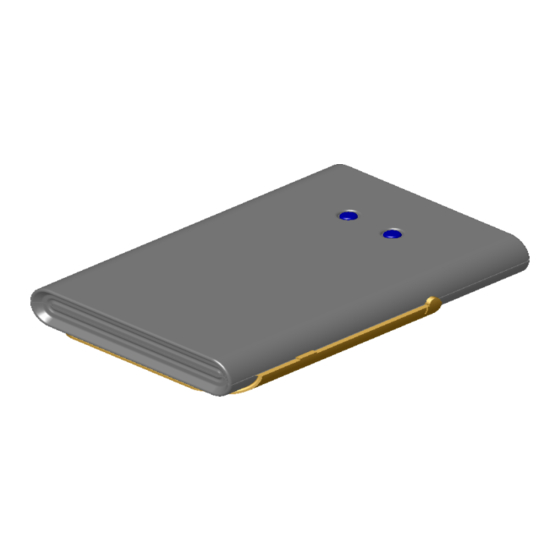
Summary of Contents for Gigabyte GN-WLBM101
- Page 1 GN-WLBM101 IEEE 802.11b Wireless USB Network Adapter User’s Manual http://www.gigabyte.com.tw Rev. 1.0 First Edition...
-
Page 2: Table Of Contents
Contents CHAPTER 1. PRODUCT OVERVIEW ..................1 1-1. I ............1 NTRODUCTION TO IRELESS DAPTER 1-2. F .........................1 EATURES 1-3. P ................1 HYSICAL IMENSIONS ACKAGING 1-4. LED I ....................2 NDICATING IGHT 1-5. S ....................2 YSTEM EQUIREMENTS 1-5-1. Supported Platform ......................2 1-5-2. Supported Operation System..................2 CHAPTER 2. -
Page 3: Chapter 1. Product Overview
Chapter 1. Product Overview 1-1. Introduction to The Wireless LAN Adapter This wireless LAN (Local Area Network) adapter is composed of the IEEE 802.11b MAC, Baseband, and radio components, USB interface, and two built-in antennas. This product adopts the direct sequence spread spectrum (DSSS) technology and the DBPSK, DQPSK, and CCK modulation mode to provide a very stable wireless communication quality and an excellent signal receiver capability. -
Page 4: Led Indicating Light
1-4. LED Indicating Light Power: The Power LED lights up when the USB wireless LAN adapter is powered on. Link The Link LED lights up when the adapter has an active connection. If the LED isn’t on, the adapter isn’t interfacing with the network. 1-5. -
Page 5: Chapter 2. Installing The Wireless Lan Adapter
Chapter 2. Installing the Wireless LAN Adapter 2-1. Installing The Driver & Utility (Applicable to any supported OS) Step 1: Please make sure that you don’t plug your USB adapter yet. Step 2: Insert our setup CD into your CDROM drive, the following window will pop up. Step 3: Click “Install Wireless LAN Driver”. - Page 6 Step 5: Click “Yes”. The wizard will ask you to click the type of setup. Step 6: Select “Typical” and then click “Next”. The wizard will ask you to provide the destination path of where the application will be installed.
- Page 7 Step 7: You can click “Browse” to set the path or simply only click “Next” to go on. Step 8: Click “Finish”, and then your installation is ok.
-
Page 8: Chapter 3. Using The Utility
(e.g. Control Panel), this application permits the dynamic modification of the configuration parameters while the adapter is operating. It also offers some more configuration options. Gigabyte offers the Configuration & Monitor Utility for Windows 98/98SE/Me, and Windows 2000/XP. It appears as an icon on the system tray of Windows every time the adapter is running (see Figure 3-1). -
Page 9: Statistics
Other items in the table are the detailed information about the link status, which are available only when the wireless LAN adapter is connected to an access point or other wireless LAN adapter. SSID: Network name. BSSID: MAC address of the base station. Channel: The current channel used by the wireless LAN adapter. -
Page 10: Configuration
3-3. Configuration A typical screen of the application in Infrastructure mode is shown in Figure 3-4. The configuration parameters are shown at the top of the screen (Operating Mode, Channel, SSID, TxRate, Int. Roaming and Radio of the USB card). In order to change the configuration parameters, click the “Change”... -
Page 11: Advanced
Figure 3-5. Encryption 3-5. Advanced By Choosing the Advanced option in any of the two modes, you can change advanced configuration settings, such as the Preamble Type, Fragmentation Threshold, and RTS/CTS Threshold (Figure 3-6). Figure 3-6 shows the default configuration for the advanced settings. -
Page 12: Profiles
Figure 3-6. Advanced Settings 3-6. Profiles This option shows you to view your current profile. You can click “New” to create a custom profile. Figure 3-7. Your current profile... -
Page 13: About
3-7. About By choosing this option, you can view basic information about the utility like the Driver, Firmware and Application Version and this adapter’s MAC address. Figure 3-7. Version information and MAC address... -
Page 14: Chapter 4. Specifications
64 bit WEP (128 bit WEP optional) Management Utility Monitors the network situation. 4-5. Mechanical Dimensions 89.2 x 62 x 14.5 mm Weight 45.4 g Packaging Packaging specially used by Gigabyte. Host Interface USB Type B connector USB cable 80cm LED indicator Power and Link...















Need help?
Do you have a question about the GN-WLBM101 and is the answer not in the manual?
Questions and answers